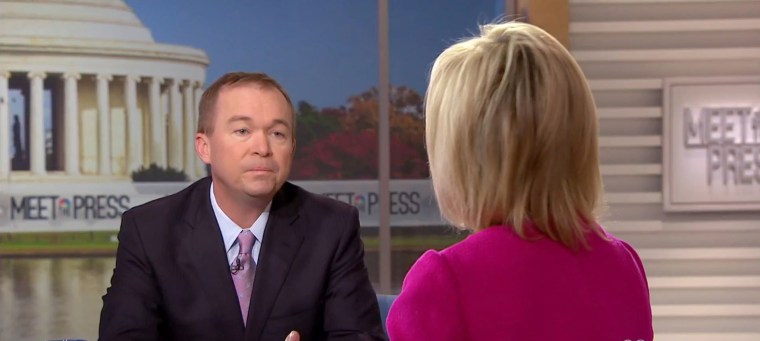WASHINGTON — Mick Mulvaney, the director of the White House Office of Management and Budget, defended President Donald Trump’s silence on the sexual misconduct accusations against Alabama Senate candidate Roy Moore on Sunday, saying the president "doesn't know who to believe."
“He has said that he thinks that the voters of Alabama should decide,” Mulvaney told NBC's Andrea Mitchell on “Meet The Press." “I think that’s the most commonsense way to look at it.”
"He doesn't know who to believe. I think a lot of folks don't," Mulvaney said of the president, adding that he personally believes the allegations "are credible."
Nine women have come forward with accusations against Moore, the Republican nominee and former chief justice of the Alabama Supreme Court, including one woman who said she was 14 when Moore initiated a sexual encounter with her when he was 32. Moore has denied the allegations.
Sen. Roy Blunt, R-Mo., said on Sunday’s “Meet The Press” that the accusations against Moore are "more credible than [Moore's] response," but added that the voters of Alabama “know Roy Moore a lot better” than he does.
Trump was quick to take aim this week at Sen. Al Franken, D-Minn., after a woman came forward to accuse Franken of groping and forcibly kissing her in 2006. Franken has apologized. But the president has not been vocal on Moore, did not answer when asked about him earlier this week, and he has not called for Moore to back out of the race.
The president’s relative silence on Moore and the national conversation on the pervasiveness of sexual harassment in America has drawn renewed attention to the women who made their own allegations against Trump last year during the 2016 presidential campaign. More than a dozen women publicly came forward to accuse Trump of sexual misconduct — all allegations Trump has denied.
When asked about Trump’s accusers, Blunt said, “whatever they had to say, people heard that and they elected President Trump president of the United States. At some point I think you ought to let the voters have a say here.”
The allegations bubbling up against lawmakers recently have ushered in a new focus on the role of sexual harassment in Congress, and both the House and the Senate have recently taken action to implement new mandatory anti-harassment training for members and staff.
Many lawmakers on Capitol Hill are trying to take that action further.
Rep. Barbara Comstock, R-Va., told a story this week to the House Committee on House Administration that she heard second-hand about a Capitol Hill staffer who quit her job after a current member of Congress answered the door in a bath towel and exposed himself to her.
On “Meet The Press,” Comstock said she believes the women who have levied accusations against Moore, and she claimed she was the first female member of Congress to call on Moore to step aside. “On that matter, Al Franken can go hit the door with him,” she added.
The process of reporting sexual harassment on Capitol Hill is a long and cumbersome experience for those who are levying the accusations.
Comstock spoke about their work to implement a new sexual harassment policy within Congress, saying they wanted “zero tolerance, anti-harassment policies in place” and didn’t want to let any members “have a pay fund for their harassment… keep the focus on these women experiencing this.”
Rep. Debbie Dingell, D-Mich., added on “Meet The Press” that she doesn’t “know a woman who doesn’t have a story.”
This week, Sen. Kristen Gillibrand, D-N.Y., said former President Bill Clinton should have resigned over his affair with White House intern Monica Lewinsky.
Asked if she agrees, Dingell responded, “I have 1,000 thoughts on all this. And, by the way, the names we're talking about now, you and I both know these stories go back forever. I want to go forward because I don't want to make sensational news.”
She did, however, add, “I was a Tsongas delegate,” referring to Clinton’s Democratic primary opponent in 1992.

